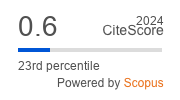PROPROTEIN CONVERTASE SUBTILISIN/KEXIN TYPE 9 (PCSK9) CONCENTRATION IN BLOOD OF MEN OF DIFFERENT POPULATION SUBGROUPS AND ITS ASSOCIATION WITH UNFAVORABLE LONG-TERM PROGNOSIS
https://doi.org/10.29001/2073-8552-2016-31-2-120-124
Abstract
The aim of the study was to investigate proprotein convertase subtilisin/kexin type 9 (PCSK9) concentration in men of different population subgroups, its associations with cardiovascular risk factors and with unfavorable 7(years long-term prognosis. The study took three subgroups of men from a population sample of residents of Novosibirsk, at the age of 44– 73 years, not using lipid-lowering drugs (including statins): the population subgroup (183 men), the subgroup with a hypercholesterolemia (46 men), and a subgroup with hypocholesterolemia (18 men). PCSK9 blood levels were determined by ELISA using the test-systems “Human Proprotein Convertase 9/PCSK9 Immunoassay” (R&D Systems). Long-term prognosis (myocardial infarction, cardiovascular death) were studied 7 years after the examination of population subgroups of men using data of the Register of Cardiovascular Mortality and Register of Myocardial Infarction. The outcome showed a normal PCSK9 distribution in population subgroups of men with hyper- and hypocholesterolemia and the abnormal distribution shifted to the left in the population group of men. Concentration of PCSK9 protein in the subgroup of men with hypercholesterolemia was by 1.2 times higher than in the population group of men. Statistically significant correlations of PCSK9 protein level with total cholesterol, LDL cholesterol, and glucose were found. PCSK9 variability was due to the influence of other factors only by 15% (R Square=0.155, p<0.001). Significant influences of HDL-cholesterol levels (Beta=0.238, p=0.023), TG (Beta=0.253, p=0.049) and LDL cholesterol (Beta=0.751, p=0.009) to protein PCSK9 blood level were revealed. Multivariate regression analysis showed a significant independent association of PCSK9 protein levels with the fact of cardiovascular death in a 7-year long-term period (p=0.048, OR=1.01). The results indicated that, in men with increasing blood levels of PCSK9 protein (by 1 ng/mL), the relative risk for cardiovascular death increased by 1% within 7 years after the examination independently of other parameters.
About the Authors
K. S. AstrakovaRussian Federation
Yu. I. Ragino
Russian Federation
E. V. Shakhtshneider
Russian Federation
E. M. Stakhneva
Russian Federation
S. V. Astrakov
Russian Federation
M. I. Voevoda
Russian Federation
References
1. Roger V.L., Go A.S., Lloyd-Jones D.M. et al. Heart disease and stroke statistics – 2011 update: a report from the American Heart Association // Circulation. – 2011. – Vol. 123. – P. e18–e209.
2. Астракова К.С., Рагино Ю.И., Шахтшнейдер Е.В., Воевода М.И. Клинические исследования моноклональных антител против пропротеиновой конвертазы субтилизин-кексинового типа 9 // Атеросклероз. – 2015. – Т. 11(2). – С. 43–49.
3. Park S.W., Moon Y.A., Horton J.D. Post-transcriptional regulation of low density lipoprotein receptor protein by proprotein convertase subtilisin/kexin type 9 a in mouse liver // J. Biol. Chem. – 2004. – Vol. 279. – P. 50630–50638.
4. Shan L., Pang L., Zhang R. et al. PCSK9 binds to multiple receptors and can be functionally inhibited by an EGF(A peptide // Biochem. Biophys. Res. Commun. – 2008. – Vol. 375(1). – P. 69–73.
5. Humphries S.E., Neely R.D., Whittall R.A. et al. Healthy individuals carrying the PCSK9 p.R46L variant and familial hypercholesterolemia patients carrying PCSK9 p.D374Y exhibit lower plasma concentrations of PCSK9 // Clin. Chem. – 2009. – Vol. 55(12). – P. 2153–2161.
6. Alborn W.E., Cao G., Careskey H.E. et al. Serum proprotein convertase subtilisinkexin type 9 is correlated directly with serum LDL cholesterol // Clin. Chem. – 2007. – Vol. 53(10). – P. 1814–1819.
7. Cui Q., Ju X., Yang T. et al. Serum PCSK9 is associated with multiple metabolic factors in a large Han Chinese population / / Atherosclerosis. – 2010. – Vol. 213(2). – P. 632–636.
8. Lakoski S.G., Lagace T.A., Cohen J.C. et al. Genetic and metabolic determinants of plasma PCSK9 levels // J. Clin. Endocrinol. Metab. – 2009. – Vol. 94(7). – P. 2537–2543.
9. Cuia Q., Jua X., Yanga T. et al. Serum PCSK9 is associated with multiple metabolic factors in a large Han Chinese population / / Atherosclerosis. – 2010. – Vol. 213. – P. 632–636.
10. Careskey H.E., Davis R.A., Alborn W.E. et al. Atorvastatin increases human serum levels of proprotein convertase subtilisin/kexin type 9 // J. Lipid Res. – 2008. – Vol. 49. – P. 394–398.
11. Mayne I.J., Ooi T.C., Raymond1 A. et al. Differential effects of PCSK9 loss of function variants on serum lipid and PCSK9 levels in Caucasian and African Canadian populations // Lipids Health Dis. – 2013. – Vol. 12. – P. 70–74.
Review
For citations:
Astrakova K.S., Ragino Yu.I., Shakhtshneider E.V., Stakhneva E.M., Astrakov S.V., Voevoda M.I. PROPROTEIN CONVERTASE SUBTILISIN/KEXIN TYPE 9 (PCSK9) CONCENTRATION IN BLOOD OF MEN OF DIFFERENT POPULATION SUBGROUPS AND ITS ASSOCIATION WITH UNFAVORABLE LONG-TERM PROGNOSIS. Siberian Journal of Clinical and Experimental Medicine. 2016;31(2):120-124. (In Russ.) https://doi.org/10.29001/2073-8552-2016-31-2-120-124




.png)





























